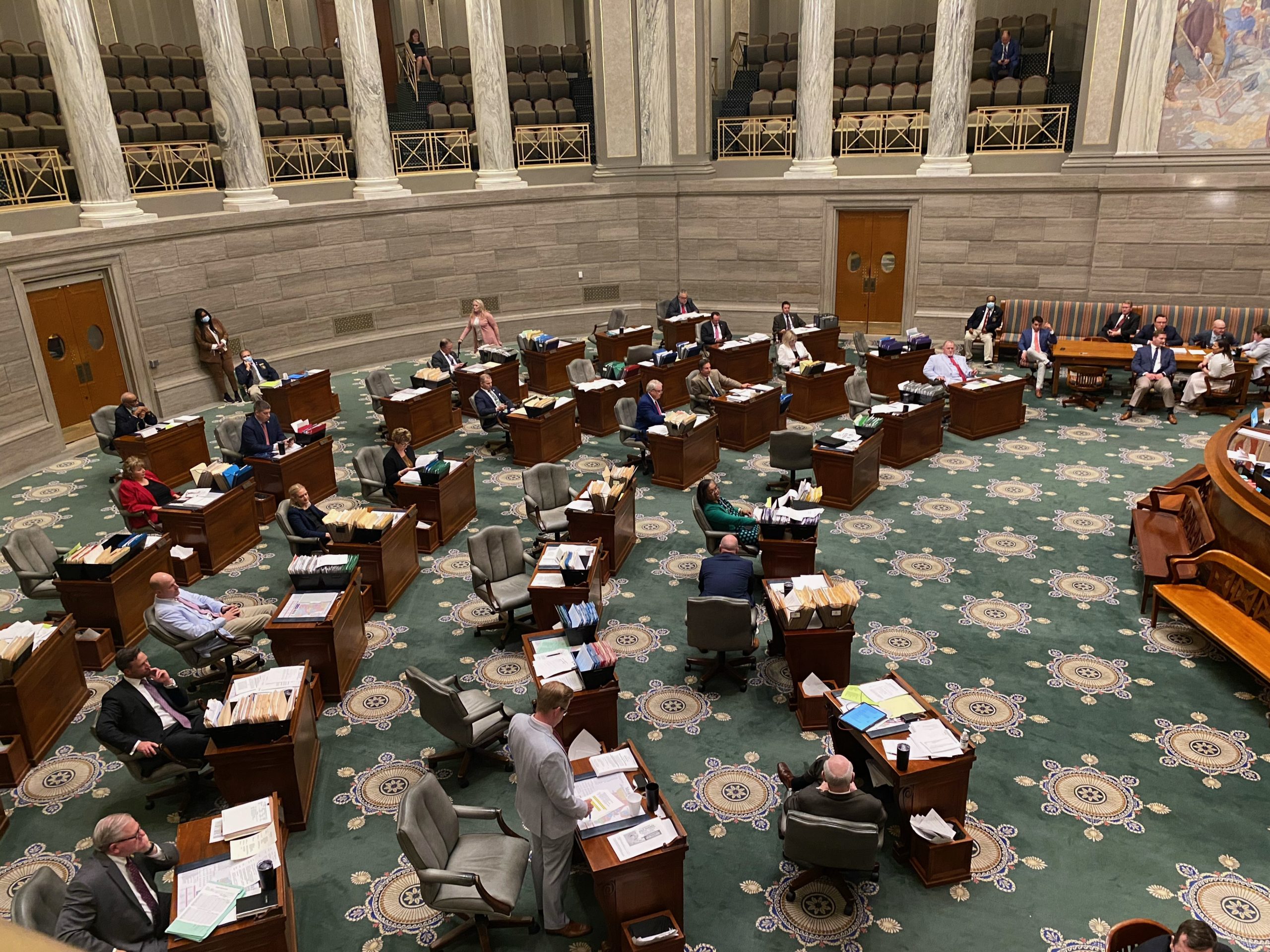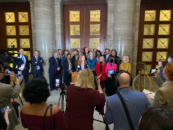JEFFERSON CITY, Mo. — It took more than nine hours and a bevy of impassioned speeches on health care, but the Missouri Senate ultimately passed its package of budget bills for FY 2022.
The $34 billion package passed out of the upper chamber shortly after midnight. The House and Senate will go to conference — with each chamber sending three Republicans and two Democrats — to hammer out the differences between both proposals.
All eyes were on Medicaid funding this year after voters approved expanding the program in August to cover an estimated additional 230,000 people. Gov. Mike Parson included $1.9 billion for Medicaid expansion in his recommended budget. The House stripped out the funding, and an effort to put half the recommended amount in a Senate committee was unsuccessful.
Here’s a look at what the Senate marked up after floor debate.
Health care
The departments of Mental Health, Health and Senior Services, and Social Services were allocated nearly $2.8 billion, $2.3 billion, and $10.7 billion respectively with the version passed by the Senate.
Democratic Sen. John Rizzo was first up with an attempt to fully fund Medicaid after Missourians voted for expansion last year. But he garnered a typically unlikely ally in his quest: Sen. Caleb Rowden, who gave an impassioned floor speech in favor of the funding.
“The question before us tonight is really simply if we should fund the expansion the people of Missouri voted on,” Rowden said. “I believe we should.”
It was during debate over the departments of Mental Health and Health and Senior Services’ budgets that Medicaid funding first came up. Rizzo put forth an amendment — resulting in debate for more than two hours — that mirrored the governor’s original proposal. It increased Medicaid funding by about $15.3 million from general revenue and almost $139 million from federal money.
Senate Appropriation Chairman Dan Hegeman, who opposed funding the Medicaid expansion, decried the “proverbial football where each side is quick to run to their base and slow to move beyond their tired talking points.” He said he was too concerned about “unknowns” and “what ifs” — particularly when it comes to relying on the federal government — to support funding the expansion.
The amendment ultimately failed 14-20 with Sens. Justin Brown, Mike Cierpiot, Lincoln Hough, and Rowden the lone Republicans voting for it.
The underlying budget bill passed 24-10. Rizzo led Democrats in voting against the measure because it did not include fully funding Medicaid.
“Because we failed to meet our obligation, I won’t be voting for the substitute,” Rizzo said. “I believe we should fund programs to the nth degree, but we’re failing in our duty. I took an oath to uphold the Constitution.”
The five conservative members who generally voted against the budget bills voted in favor of HB 10.
Rizzo offered the same amendment to HB 11, funding the Department of Social Services, but it also failed. Democrats, too, voted against the measure.
Of course, abortion played a role in the health care budget process. Conservative members discussed the possible revocation of the Hyde Amendment and a hypothetical future where abortions would solely be funded by taxpayers.
Education
The Department of Elementary and Secondary Education (DESE) would receive $7.5 billion under the Senate’s version of HB 2. The Senate also allocated more than $1.4 billion for the Department of Higher Education and Workforce Development.
This year also saw another request to allow DACA recipients to qualify for in-state tuition at public universities. Since 22015, the budget has required DACA students to pay international rates for higher education. An attempt to change that in 2019 was nearly successful but ultimately failed.
Despite a brief pause to address a printing issue, the education budget bill progressed without much consternation.
Transportation
While most of the budget bills passed without much fanfare, one non-health care-related one — concerning $3 billion in funding for the Missouri Department of Transportation (MoDOT) — ground to a halt when an amendment from Sen. Bob Onder sought to allow concealed carry on public transit companies was subject to a point of order. After more than an hour, the point of order was well taken and the amendment sent back.
Onder immediately followed up with another provision to eliminate the allocation for the State Transportation Fund for the MoDOT Transit Program, an item amounting to $1.7 million in the underlying bill for public transit. Onder fielded concerns from multiple senators on both sides of the aisle about the impact the change could have on their communities’ transportation systems — especially for lower-income individuals.
Onder said his second amendment, which stalled proceedings, wasn’t in retaliation for how the point of order ruling went; however, most senators did not seem to believe him. It was voted down 6-25. Sens. Mike Moon, Rick Brattin, Eric Burlison, Bill Eigel, and Andrew Koenig along with Onder voted in favor.
Conservation
Under the Senate’s recommendation, the departments of Agriculture, Conservation, and Natural Resources would receive $62 million, $624.9 million, and $180 million, respectively. Funds would go toward energy improvement studies with nearly $49 million for promoting renewable energy and another $49 million for low-income weatherization efforts. The bill passed 27-5.
Economic Development
Under the Senate’s recommendation, the departments of Economic Development, Commerce and Insurance, and Labor and Industrial Relations would receive $746 million, $66 million, and $298 million, respectively.
Through the Senate’s version, the Labor Department is set to receive $48 million to cover state unemployment overpayments issued during the pandemic; the issue has been a focal point of both chambers this year, with legislators banding together across the aisle to oppose attempts to recover mistaken payments.
Another line item would funnel $15 million into rural broadband grants, with $10 million of that allotment coming from federal stimulus funds.
Corrections, Public Safety, Judiciary
The Department of Corrections budget included $21.5 million to attract more officers and employees into the department.
It also included $14 million for county jail arrearage. Missouri’s “one of a kind” jail reimbursement program — through which the Corrections Department reimburses county jails for housing, transportation, and otherwise taking care of individuals convicted of a felony — has been a point of contention as the state has built a backlog to repay counties.
The Senate’s budget bill for this department passed 33-1 with Sen. Paul Wieland as the lone no vote. He always votes against this budget provision because he is anti-death penalty.
The Department of Public Safety (DPS) would receive more than $976 million under the Senate version of its budget proposal.
Under the Senate’s version of HB 12, elected officials would be appropriated more than $201.8 million for the 2022 fiscal year while the Judiciary would receive $246 million, public defenders would receive more than $56 million, and the General Assembly would receive more than $39 million. The judiciary fund also included $2.8 million for the replacement of Missouri’s CaseNet record system.
Final notes
In the middle of debate, Sen. Caleb Rowden praised Sen. Dan Hegeman, the appropriations chair.
“Over the course of my few years in leadership, working with you has been a pleasure,” Rowden said. “There’s no one better to do the job you’re doing than you.”
Many of the bills saw the same five lawmakers voting against the provisions: Sens. Rick Brattin, Eric Burlison, Bill Eigel, Mike Moon, and Bob Onder. Conservative members have voted against the budget in the past; Burlison and Eigel cast no votes last year.
Medicaid funding response
Jeremy Cady, Americans for Prosperity-Missouri: “Our lawmakers were right to stand strong against wasteful spending and fiscal irresponsibility by opposing the expansion of the broken Medicaid system. Missouri voted for a program it could not afford under the misguided promise that it would save taxpayers $39 million in the first year. This is a blatant falsehood. Instead, it would have dramatically increased costs for taxpayers at an estimated $349 million each year, crowding out services for those who need it most. We commend the Senate for rejecting Medicaid expansion funding, which would have brought disastrous consequences to taxpayers across the state.”
Emily Kalmer, Missouri director of government relations for the American Cancer Society Cancer Action Network: “ACS CAN is disappointed to see the Senate ignoring the will of Missouri voters. … We know the health insurance coverage provided through an expansion of MO HealthNet eligibility will improve outcomes, address health and cancer disparities, and reduce the burden of cancer by offering enrollees access to doctor visits, preventive services and timely cancer screenings. Early detection of cancer increases a patient’s chance of survival.”





















